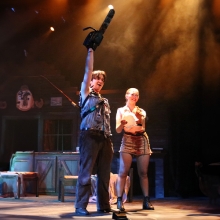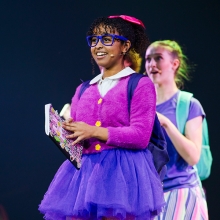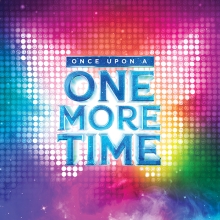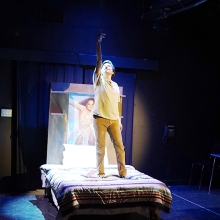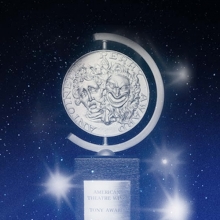During the summer, MTI's office will close at 3 PM ET on Fridays. On Friday, August 30th, the office will close at 1 PM ET for the Labor Day holiday weekend.
Filichia Features: Music Math Charms to Soothe the Savage Kid
Filichia Features: Music Math Charms to Soothe the Savage Kid
It’s a long-held theory that people who are good at math are also good in music.
So why not a musical about math?
Many people are responsible for one aimed at the K-to-Grade Four set. It’s The Main Street Kid's Club: A Mathstart Musical.
It all started with Stuart J. Murphy, who in 1993 thought about writing books about math that would be aimed at young children.
“Math is a life skill,” says Murphy. “It’s a part of how we communicate. It’s part of everything we do. You can’t get through the day without math.”
Murphy has needed his math skills to count his many successes. Twenty years later, he’s penned 63 books that have racked up more than $10 million in sales around the world.
Janet A. Ginsburg, who works with Murphy in marketing, research and development, thought that even more could be done with the books. She spoke to Rives Collins, an associate professor in Northwestern University’s theater department. Because Collins has an MFA in Child Drama, Ginsburg assumed he’d be able to help in jump-starting a musical based on one or more of these books.
She was right. Collins called Scott Ferguson, a bookwriter-lyricist who wrote Schoolhouse Rock Live! and has been involved with children’s theater since his own childhood in Arkansas.
Ferguson in turn got writer Michael Mahler to come on board. “Michael struck me as right because we wanted music that sounds like fun, hip and cool. He has a sound that’s both hip-hop and jazz.”
“Meanwhile, I was delighted that Scott was interested,” says Ginsburg. “I saw the productions of Aida and Bloody Bloody Andrew Jackson that he directed and I was overwhelmed.”
Ferguson and Mahler must have been overwhelmed, too, when Murphy’s 63 books showed up at their doorsteps. Their job was to find the stories that were the most likely candidates for musicalization.
The class that Ferguson teaches helped. Says the writer, “The 18 students in ‘The Creation of Children’s Musicals’ suggested ideas. I’d then write the scenes and come in the next day; they’d perform the scenes and offer criticism.”
Murphy himself stopped in one day to help and to ensure that all was going well. “The idea of teaching math concepts within the context of a story was important to me. Kids should know how to use math – not just learning math, mind you, but how to apply it to real-life situations.”
To that end, Ferguson and Mahler eventually found six that struck them as the most musical-worthy: Captain Invincible and the Space Shapes, Lemonade for Sale, Less Than Zero, More or Less, Treasure Map and 100 Days of Cool.
“For example,” says Murphy, “100 Days of Cool helps a child to learn about numbers up to 100. Lemonade for Sale deals with bar graphs. Captain Invincible is concerned with three-dimensional objects.”
The quartet resulted in The Main Street Kid's Club: A Mathstart Musical. It’s a show meant for children but ideally performed by middle-schoolers and high-schoolers. That’s a great idea, for little kids automatically admire bigger kids. The young ‘uns will pay attention to these tweens and teens that they can’t wait to be: Sheri, the smart girl; Meg, the tomboy; Danny, the class clown and Matthew, the leader.

But wait! Musicals rely on emotion far more than math does. Ferguson and Mahler were well aware of this, and circumvented any bloodlessness by creating a character not found in Murphy’s books.
He’s Toby, the new kid on the block, a victim of one of the hardest experiences that any young person can endure: moving from one town to another in the middle of the school year. Toby hasn’t merely lost all his friends from his old neighborhood, but he’s also been thrust into a strange classroom where other kids have their friends in place and aren’t necessarily looking for a new one.
Thus, Ferguson wisely conceived that the “friends” that Toby would have would be the kids in the audience. Unlike the other four characters, he talks directly to the crowd and take the kids into his confidence. The result is the young theatregoers root for him among all others.
Toby wants to join the club because that’s where one finds the school’s most popular boys and girls. Murphy worked hard to ensure that his kids wouldn’t be, to use that unfortunate word, nerds, and that there was nothing, to use another unfortunate word, dorky, about their feeling that “math skills equal life skills.”
Ferguson and Mahler included Murphy’s sentiments to the point where these kids would thrill everyone from Archimedes to Alan Turing. Insists Sheri, “A world without math is like a sundae with no cherry.” All four state, “We pledge to figure out tough problems by using our mighty brain power.”
But alas, Toby has no native math ability. What he does have, however, is a treasure map, which he hopes will be enough to gain his admittance into the club. Wouldn’t you know that he loses the thing?
So the club members give Toby an entrance exam. “Any number that is below zero is called what?” Toby surprises himself by answering “A negative number,” suggesting that all of us know more than we think.
The kids reveal that their teacher inspired them to experience “100 Days of Cool” – meaning that for more than three months, they made an effort each day to do something extraordinary. That ranged from wearing overly colorful socks, attaching a baseball card to each spoke of one’s bicycle wheel, dressing in ‘60s hippie fashions and hablando en español.
And what, you may ask, does any of this have to do with math? Perhaps a piece of Mahler’s and Ferguson’s song says it best: “90 days are left … you’re just a tenth of the way there.”
There’s another math problem on the horizon: Danny wants some Heely skate shoes which cost $50 and he only has $20. “That’s not even half of what I need,” he moans. No, but the kids in the audience will learn that he does have 40% towards his goal.
Danny’s plight reminds the kids of a story, which they re-enact. Indeed, Danny does have quite a bit in common with Perry the Penguin, which is why he’ll play the title role in this musical-within-a-musical.
Perry earns a little money by working, but isn’t able to resist spending it on frivolities. He borrows money from a friend, but then endures the embarrassment when he can’t pay it back. Then he loses the little he has. How nice that his friends all help him look for the lost money – and nicer still that a neighbor finds it and returns it.
The math component of the tale obviously involves addition and subtraction as Perry’s fortunes go up and down, but his progress (and lack of it) is literally charted by bar graphs, all colorfully presented.
Well, Perry’s economic woes are solved, but Danny’s are not. And considering that the clubhouse is in such woebegone shape, the kids could use some extra money to spruce it up. That’s when Danny finds Toby’s map. He and the club members go off in search of treasure, leaving Toby behind to guard the clubhouse – even though he hasn’t yet been made a card-carrying club member.
“I know that I could fit right in if I could just be me,” he sings in the show’s one ballad. “Yes,” admits Ferguson, “kid theatergoers have a tendency to resist ballads. Usually, though, those are the ones that are misplaced or inserted for no real purpose.”
While waiting for the kids to return, Toby finds a book about a man who blindfolds himself and yet can guess ages of people put before him. Toby decides to give it a try, and is soon saying to kids in the audience: “Is your age less than ten? Are you older than seven? Is your age an even number?” Little kids love this type of interaction in the theater, and the authors were wise to include such an interlude. And needless to say, its math value is obvious.
The treasure map leads to a mini-lesson on map-reading, especially in teaching the scale of a map versus the distance on the ground. But alas, the treasure turns out to be dubloon-deprived. At least the box they find contains an old comic book centering on Captain Invisible, and that’s all these kids need to put on a show.
But because they didn’t find the needed money, they must raise it the old-fashioned way: by earning it via a lemonade stand. They do quite well with it, and Toby’s the one to chart profits and calculate sales growth. That’s enough to get him full club membership. (Even math musicals have happy endings.)
Murphy and Ginsburg are delighted by what Ferguson and Mahler have forged. “For years,” she says, “there’s been an education coalition called STEM – an acronym for Science, Technology, Engineering and Math. But after a while, people at the Rhode Island School of Design, of which Stuart is an alumnus, decided to make that into STEAM – with that added ‘A’ for art. The Main Street Kid's Club: A Mathstart Musical fits right into that.”
 You may e-mail Peter at pfilichia@aol.com. Check out his weekly column each Tuesday at www.masterworksbroadway.com and each Friday at www.kritzerland.com. His new book, Strippers, Showgirls, and Sharks – a Very Opinionated History of the Broadway Musicals That Did Not Win the Tony Award is now available at www.amazon.com.
You may e-mail Peter at pfilichia@aol.com. Check out his weekly column each Tuesday at www.masterworksbroadway.com and each Friday at www.kritzerland.com. His new book, Strippers, Showgirls, and Sharks – a Very Opinionated History of the Broadway Musicals That Did Not Win the Tony Award is now available at www.amazon.com.
Share
Callboard
-
Shake and shimmy it with the #Hairspray20Challenge! Join MTI and Broadway Media in celebrating 20 years of #Hairspray. Duet this here or find us on TikTok! Special thanks to @broadwaymedia and @jammyprod. Choreography Guides are a licensor official resource that provides step-by-step instruction from Broadway and professional choreographers for your productions! Visit @broadwaymedia to learn more. #mtishows #youcantstopthebeat #hairspraymusical #goodmorningbaltimore
View on Instagram






















